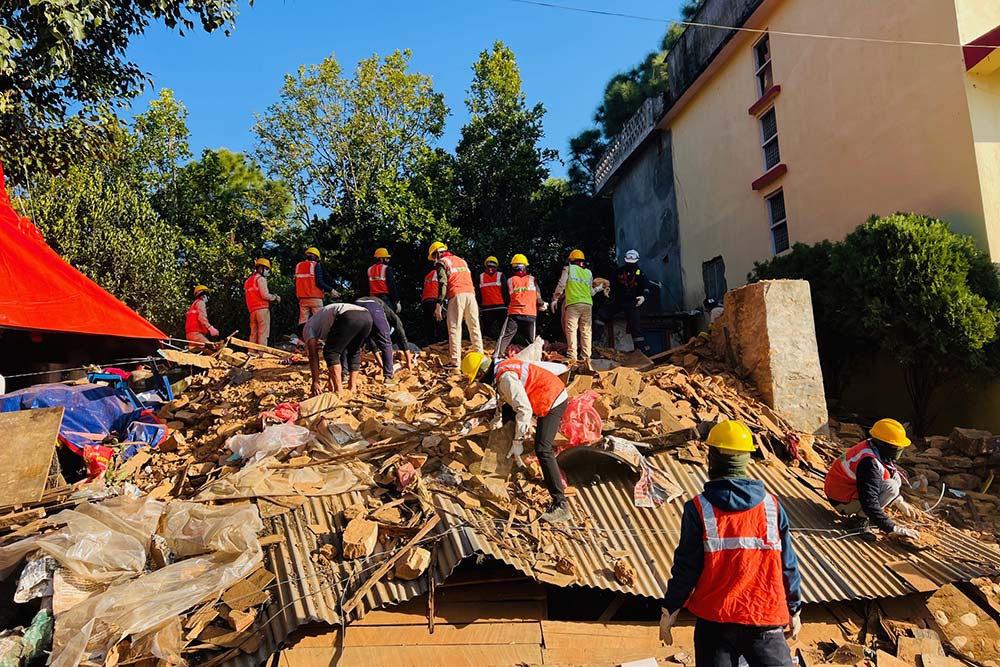
The ramifications of Covid 19 pandemic has left no business untouched, big or small. When the virus was first reported in December 2019 in Wuhan in China, people had no inkling about the economic crisis it would unfold. As it spread throughout the world, governments started to impose blanket lockdowns and travel restrictions to curb its spread. Businesses were closed down indefinitely with severe implications on livelihoods. A huge number of businesses closed down their operations permanently.
According to a survey conducted by Nepal Rastra Bank (NRB), only around 4% of businesses were in operation in June last year during peak lockdown period. But by November that year, the situation improved and about 54% companies started operating and by April this year there were approximately 81.2% businesses in operation. The survey also states that 4.2% of enterprises are still struggling to come back into operations.
The pandemic has hit businesses in such a manner that while some have closed down for good, others that are now open are still grappling with survival issues at different levels of intensity. In this issue we look into issues that have plagued businesses run by women entrepreneurs and what they are doing to overcome the challenges.
As per the Federation of Women Entrepreneurs Association of Nepal, around 15% of enterprises run by women have collapsed since the outbreak of the pandemic. Similarly, the number of women entrepreneurs seeking loans has also surged dramatically with a report prepared by The Asia Foundation mentioning that women entrepreneurs seeking loans has gone up from a mere 7,000 to 30,000.
During the lockdown in Nepal, some sectors had to remain closed totally while some, especially those dealing with food products, were allowed to open albeit with restrictions in the number of hours they were allowed to stay open. Bimala Sunwar, Managing Director of White Lotus Organic Concern Nepal, says unlike hotels and other tourism related businesses that had to completely shut down, businesses like hers were allowed to function but the impact did not leave them untouched.
“Though we were partially open, our sales was highly affected since the market was literally closed and the flow of the products was slow,” Sunwar says. She adds that even when partially open they did not receive many customers as there were travel restrictions in place and people could not visit to make purchases.
“The other factor that hit us really hard was that many people were out of jobs or were not receiving full pay. So, people had to manage with whatever little they had,” she shares, adding that since organic products are a bit costlier people opt for cheaper goods.
Meanwhile, Deepika Shrestha, Co-Founder of Pack My Lunch, says during the initial lockdown they had to completely close down their business. Most companies were shut and even those that remained open had adopted ‘work from home’ so it was natural for demand for their service to decline. “But in business we have to learn to adapt to the changing situation and introduce changes if we want to survive,” she states.
Shrestha shares that they had to be creative, and towards this they have started retail of traditional Nepali sweets. “We have now transitioned to retail too and are offering home delivery of Nepali sweet items,” she says.
Even though the pandemic affected a majority of the businesses, there were some businesses that witnessed growth. One example is Thulo.com that experienced a vertical surge in business during the pandemic. Surakchya Adhikari, Co-founder and COO of Thulo.com, states they have been delivering grocery items and essential products since 2016. “The lockdown was an opportunity for us as people were confined to their homes and chose to shop online,” she says.



 Adhikari shares that while business did boom, it came with its own set of challenges. “Managing the deliveries was hectic because there were many government rules imposed and at times even our delivery persons were restricted from travelling,” she recalls. The other problems included high demand for certain goods but low supply and shortage of manpower to make deliveries.
However the Covid pandemic has also taught some important business lessons to entrepreneurs, says Adhikari. “We learnt that there was no way we could sit back and wait for things to go back to normal. We had to devise ways so that we could turn the crisis into an opportunity,” she states, adding, “We have had to learn to come out of the crisis stronger.”
But the pandemic was not as kind to entrepreneurs like Sunita Nhemaphuki, Chairperson of R&D Innovative Solution who had to deal with financial as well as mental stress during the lockdown. “Being a woman I also had to look after the household work along with running the organisation. My two businesses, an agriculture related information sheet magazine and the mart we have in the valley where we sell organic foods sourced from rural areas have been shut even now but we are trying to reopen,” she says.
Nhemaphuki adds that it was not only her business that took a major hit but the farmers too through whom her company purchases agricultural products suffered. “There are hundreds of farmers who sell their products to our mart but since we could not open they too have been majorly affected.” She adds that during the first lockdown she suffered a loss of around Rs two million as all the stock was damaged by rodents.
On a positive note, Nhemaphuki says that as an entrepreneur one must never get bogged down by the obstacles that come your way. “I came up with the concept of urban farming or roof-top farming to be precise so that people could grow organic vegetables and fruits even in city areas,” she shares. As a businessperson you cannot put all eggs in one basket and hope that everything will go well, she says, “You must always be willing to learn and adapt. So, the roof-top farming concept was just another source of revenue to keep our mainstream business alive.”
Even though entrepreneurs had to go through harrowing times due to the lockdowns, one positive aspect was that many banks and even the government was forthcoming with help for enterprises to survive. Shrestha says that many banks introduced new loan schemes and some even were willing to provide loans at low interest rates and without collateral. “We have been able to secure a low-interest loan through a small scale loan scheme introduced for women entrepreneurs which has helped us kick start things after the second lockdown,” she shares.
Nhemaphuki says the government also has played its part in helping businesses survive and is in the process of endorsing some laws that are related to ecommerce. Utilising the digital platform is another big lesson that most business people have learnt during this pandemic, she says, adding that even customers who used to refrain from such platforms have started making using of it.
“Due to the pandemic the government definitely has understood the importance of digital transformation of businesses and it has started drafting regulations and facilitating businesses for online trade in Nepal,” says Adhikari.
Read this also:
Adhikari shares that while business did boom, it came with its own set of challenges. “Managing the deliveries was hectic because there were many government rules imposed and at times even our delivery persons were restricted from travelling,” she recalls. The other problems included high demand for certain goods but low supply and shortage of manpower to make deliveries.
However the Covid pandemic has also taught some important business lessons to entrepreneurs, says Adhikari. “We learnt that there was no way we could sit back and wait for things to go back to normal. We had to devise ways so that we could turn the crisis into an opportunity,” she states, adding, “We have had to learn to come out of the crisis stronger.”
But the pandemic was not as kind to entrepreneurs like Sunita Nhemaphuki, Chairperson of R&D Innovative Solution who had to deal with financial as well as mental stress during the lockdown. “Being a woman I also had to look after the household work along with running the organisation. My two businesses, an agriculture related information sheet magazine and the mart we have in the valley where we sell organic foods sourced from rural areas have been shut even now but we are trying to reopen,” she says.
Nhemaphuki adds that it was not only her business that took a major hit but the farmers too through whom her company purchases agricultural products suffered. “There are hundreds of farmers who sell their products to our mart but since we could not open they too have been majorly affected.” She adds that during the first lockdown she suffered a loss of around Rs two million as all the stock was damaged by rodents.
On a positive note, Nhemaphuki says that as an entrepreneur one must never get bogged down by the obstacles that come your way. “I came up with the concept of urban farming or roof-top farming to be precise so that people could grow organic vegetables and fruits even in city areas,” she shares. As a businessperson you cannot put all eggs in one basket and hope that everything will go well, she says, “You must always be willing to learn and adapt. So, the roof-top farming concept was just another source of revenue to keep our mainstream business alive.”
Even though entrepreneurs had to go through harrowing times due to the lockdowns, one positive aspect was that many banks and even the government was forthcoming with help for enterprises to survive. Shrestha says that many banks introduced new loan schemes and some even were willing to provide loans at low interest rates and without collateral. “We have been able to secure a low-interest loan through a small scale loan scheme introduced for women entrepreneurs which has helped us kick start things after the second lockdown,” she shares.
Nhemaphuki says the government also has played its part in helping businesses survive and is in the process of endorsing some laws that are related to ecommerce. Utilising the digital platform is another big lesson that most business people have learnt during this pandemic, she says, adding that even customers who used to refrain from such platforms have started making using of it.
“Due to the pandemic the government definitely has understood the importance of digital transformation of businesses and it has started drafting regulations and facilitating businesses for online trade in Nepal,” says Adhikari.
Read this also:



 Adhikari shares that while business did boom, it came with its own set of challenges. “Managing the deliveries was hectic because there were many government rules imposed and at times even our delivery persons were restricted from travelling,” she recalls. The other problems included high demand for certain goods but low supply and shortage of manpower to make deliveries.
However the Covid pandemic has also taught some important business lessons to entrepreneurs, says Adhikari. “We learnt that there was no way we could sit back and wait for things to go back to normal. We had to devise ways so that we could turn the crisis into an opportunity,” she states, adding, “We have had to learn to come out of the crisis stronger.”
But the pandemic was not as kind to entrepreneurs like Sunita Nhemaphuki, Chairperson of R&D Innovative Solution who had to deal with financial as well as mental stress during the lockdown. “Being a woman I also had to look after the household work along with running the organisation. My two businesses, an agriculture related information sheet magazine and the mart we have in the valley where we sell organic foods sourced from rural areas have been shut even now but we are trying to reopen,” she says.
Nhemaphuki adds that it was not only her business that took a major hit but the farmers too through whom her company purchases agricultural products suffered. “There are hundreds of farmers who sell their products to our mart but since we could not open they too have been majorly affected.” She adds that during the first lockdown she suffered a loss of around Rs two million as all the stock was damaged by rodents.
On a positive note, Nhemaphuki says that as an entrepreneur one must never get bogged down by the obstacles that come your way. “I came up with the concept of urban farming or roof-top farming to be precise so that people could grow organic vegetables and fruits even in city areas,” she shares. As a businessperson you cannot put all eggs in one basket and hope that everything will go well, she says, “You must always be willing to learn and adapt. So, the roof-top farming concept was just another source of revenue to keep our mainstream business alive.”
Even though entrepreneurs had to go through harrowing times due to the lockdowns, one positive aspect was that many banks and even the government was forthcoming with help for enterprises to survive. Shrestha says that many banks introduced new loan schemes and some even were willing to provide loans at low interest rates and without collateral. “We have been able to secure a low-interest loan through a small scale loan scheme introduced for women entrepreneurs which has helped us kick start things after the second lockdown,” she shares.
Nhemaphuki says the government also has played its part in helping businesses survive and is in the process of endorsing some laws that are related to ecommerce. Utilising the digital platform is another big lesson that most business people have learnt during this pandemic, she says, adding that even customers who used to refrain from such platforms have started making using of it.
“Due to the pandemic the government definitely has understood the importance of digital transformation of businesses and it has started drafting regulations and facilitating businesses for online trade in Nepal,” says Adhikari.
Read this also:
Adhikari shares that while business did boom, it came with its own set of challenges. “Managing the deliveries was hectic because there were many government rules imposed and at times even our delivery persons were restricted from travelling,” she recalls. The other problems included high demand for certain goods but low supply and shortage of manpower to make deliveries.
However the Covid pandemic has also taught some important business lessons to entrepreneurs, says Adhikari. “We learnt that there was no way we could sit back and wait for things to go back to normal. We had to devise ways so that we could turn the crisis into an opportunity,” she states, adding, “We have had to learn to come out of the crisis stronger.”
But the pandemic was not as kind to entrepreneurs like Sunita Nhemaphuki, Chairperson of R&D Innovative Solution who had to deal with financial as well as mental stress during the lockdown. “Being a woman I also had to look after the household work along with running the organisation. My two businesses, an agriculture related information sheet magazine and the mart we have in the valley where we sell organic foods sourced from rural areas have been shut even now but we are trying to reopen,” she says.
Nhemaphuki adds that it was not only her business that took a major hit but the farmers too through whom her company purchases agricultural products suffered. “There are hundreds of farmers who sell their products to our mart but since we could not open they too have been majorly affected.” She adds that during the first lockdown she suffered a loss of around Rs two million as all the stock was damaged by rodents.
On a positive note, Nhemaphuki says that as an entrepreneur one must never get bogged down by the obstacles that come your way. “I came up with the concept of urban farming or roof-top farming to be precise so that people could grow organic vegetables and fruits even in city areas,” she shares. As a businessperson you cannot put all eggs in one basket and hope that everything will go well, she says, “You must always be willing to learn and adapt. So, the roof-top farming concept was just another source of revenue to keep our mainstream business alive.”
Even though entrepreneurs had to go through harrowing times due to the lockdowns, one positive aspect was that many banks and even the government was forthcoming with help for enterprises to survive. Shrestha says that many banks introduced new loan schemes and some even were willing to provide loans at low interest rates and without collateral. “We have been able to secure a low-interest loan through a small scale loan scheme introduced for women entrepreneurs which has helped us kick start things after the second lockdown,” she shares.
Nhemaphuki says the government also has played its part in helping businesses survive and is in the process of endorsing some laws that are related to ecommerce. Utilising the digital platform is another big lesson that most business people have learnt during this pandemic, she says, adding that even customers who used to refrain from such platforms have started making using of it.
“Due to the pandemic the government definitely has understood the importance of digital transformation of businesses and it has started drafting regulations and facilitating businesses for online trade in Nepal,” says Adhikari.
Read this also:
Published Date: September 27, 2021, 12:00 am
Post Comment
E-Magazine
RELATED Feature





